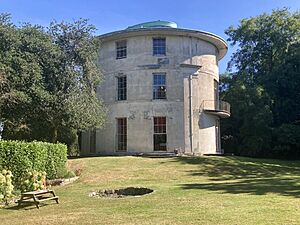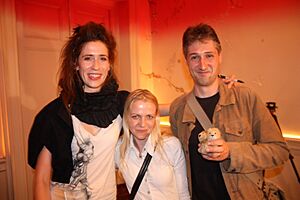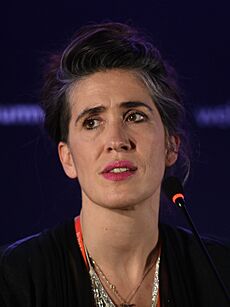Imogen Heap facts for kids
Quick facts for kids
Imogen Heap
|
|
|---|---|

Heap at SXSW London 2025
|
|
| Born |
Imogen Jennifer Jane Heap
9 December 1977 Romford, London, England
|
| Other names | Him Gone Ape |
| Education | BRIT School |
| Occupation |
|
| Years active | 1995–present |
| Children | 1 |
| Relatives | James Paterson (great-grandfather) |
| Musical career | |
| Genres |
|
| Instruments |
|
| Labels | |
Imogen Jennifer Jane Heap (born 9 December 1977) is an English musician, singer, songwriter, and record producer. She is known for being a leader in pop music, especially electropop, and for her innovative use of music technology.
While studying at the BRIT School, Heap signed with an independent record label called Almo Sounds. She then released her first album, I Megaphone (1998). In 2000, she formed the electronic music duo Frou Frou with producer Guy Sigsworth. Their song "Let Go" became widely known after being used in the film Garden State (2004).
Heap produced, recorded, sang, and mixed her second album, Speak for Yourself (2005), all by herself. She released it through her own label, Megaphonic Records. The song "Hide and Seek" became very popular internationally after appearing in the TV show The O.C. Her song "Headlock" became a huge hit on TikTok in 2024. It was her first song to appear on the Billboard Hot 100 chart. Heap's third album, Ellipse (2009), reached the top five on the Billboard 200 chart. She won a Grammy Award for Best Engineered Album, Non-Classical for this album. Her fourth album, Sparks (2014), topped Billboard's Dance/Electronic Albums chart. Heap also had success with her 2016 children's song "The Happy Song."
Heap is famous for her creative music style and her work on film and TV soundtracks. She also developed the Mi.Mu Gloves, which are special musical gloves. In recent years, she has become known for her work with and support for artificial intelligence in music. She created the music for the play Harry Potter and the Cursed Child (2016), winning a Drama Desk Award for it. She also won a Grammy Award for Album of the Year for her work on Taylor Swift's album 1989 (2014).
Contents
Early Life and Musical Beginnings
Imogen Jennifer Jane Heap was born on 9 December 1977 in Romford, England. She was named after British composer Imogen Holst. Her mother was an art therapist, and her father sold construction rocks. Her great-grandfather was the Scottish painter James Paterson.
Heap grew up in the Round House, an old elliptical house built in 1792. She later bought the house in 2006 and turned its basement into a recording studio called the Hideaway. She started playing music very early, learning piano at age two. She said she wanted attention and found she could make a lot of noise with the piano. Music was a big part of her family life.
She didn't enjoy playing classical music by composers like Bach or Beethoven. Instead, she would try to play in their style to make her parents think she was practicing. As a child, she recorded music by playing piano on a cassette tape and then singing over it. Around age 10, she wrote Christmas carols for her school choir. She learned to play several instruments, including piano, cello, and clarinet, at Friends' School.
Her music teacher would send her to the school's music technology room as a punishment. There, she taught herself how to sample music. At age twelve, she learned to use Cubase on an Atari ST computer. By age thirteen, she began writing her own songs. At fifteen, she started using reel-to-reel recording and home computers to create her music.
Career Highlights
Starting Her Music Journey (1995–1999)
Heap began studying at the BRIT School at age 16. She planned to write orchestral music but started singing and writing songs because she felt lonely. Her first song with her own vocals, "Missing You," was noticed by manager Mickey Modern. At 18, she signed her first record deal with Almo Sounds.
In 1996, Heap worked with the band Acacia as a guest vocalist. Her first big solo performance was at the 1996 Prince's Trust Concert in Hyde Park.
Her first commercial single, "Getting Scared," came out in 1997. Her debut album, I Megaphone, was released in 1998. It featured personal lyrics. Even though it got some radio play in the US, the album didn't sell well. Almo Sounds was bought by another company, and Heap was left without a record deal.
During this time, she appeared on two other songs. One was "Meantime" for a film soundtrack. The other was "Blanket" with the hip hop band Urban Species in 1998. "Blanket" was her first song to appear on the UK Singles Chart.
Forming Frou Frou (2000–2004)
In 2000, Heap and Guy Sigsworth created the electronic duo Frou Frou. They planned to make an album with different singers on each song. Heap also sang on two songs for English guitarist Jeff Beck's 2001 album.
Frou Frou released their only album, Details, in 2002. Their song "Let Go" became very popular after being used in the 2004 film Garden State. The album received good reviews but didn't sell many copies. The record label dropped Frou Frou. Heap turned down a solo deal from them. The duo broke up but briefly reunited to record a cover of "Holding Out for a Hero" for the 2004 film Shrek 2.
Heap also recorded a song for the TV series Six Feet Under in 2004.
Independent Success with Speak for Yourself (2005–2006)
After Frou Frou ended, Heap decided to make her next album on her own. She used her own money to fund it, booking studio time and buying equipment. She wanted to create the album without any outside help. She also shared her journey of making the album on her website.
In May 2005, Heap released "Hide and Seek." The song became famous internationally after it was used in the TV show The O.C. Its appearance in the show made it very popular on iTunes. It later became a gold-certified song in the US. A funny parody of the scene on Saturday Night Live in 2007 made the song even more well-known. It was also sampled in the 2009 hit song "Whatcha Say" by Jason Derulo.
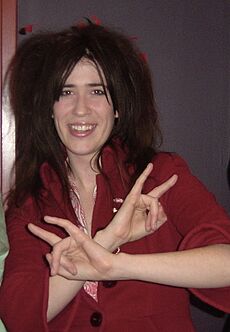
Heap released her second album, Speak for Yourself, in July 2005 through her own label, Megaphonic Records. She wrote, produced, recorded, and mixed the entire album herself. She also played most of the instruments and designed the artwork. The album was later released in the US and Europe by other labels. Speak for Yourself is considered her breakthrough album. It received positive reviews, with people praising her voice, songwriting, and creativity.
In August 2005, Heap covered the song "Spooky" for the film Just Like Heaven. In November 2005, she wrote and produced "Can't Take It In" for the film The Chronicles of Narnia: The Lion, the Witch and the Wardrobe. This song was nominated for a Grammy Award in 2007.
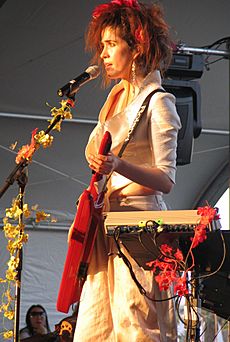
After touring for Speak for Yourself, Heap performed at Coachella and toured the US in 2006. She recorded an a cappella cover of "Hallelujah" for The O.C. in May 2006. By mid-2006, Heap was one of the most popular musicians on Myspace. She was known as a "download diva" for her strong online presence and independent success.
Creating Ellipse (2007–2010)
Starting in 2007, Heap began posting YouTube video blogs to show the making of Ellipse, her third album. She recorded the album in the basement of her childhood home, using sounds from around the house as instruments. The album's name was inspired by the elliptical shape of her house.
Its first single, "First Train Home", was released in July 2009. Heap held a contest for fans to submit photos for the album's artwork. Ellipse was released in August 2009. Like Speak for Yourself, Heap mostly created Ellipse by herself. She wrote, produced, and mixed the entire album.
Critics generally liked Ellipse, praising its mix of electronic music with natural sounds. It debuted at number five on the Billboard 200 chart, becoming her highest-charting album there. It also appeared on the UK Albums Chart for the first time. Heap won a Grammy Award for Best Engineered Album, Non-Classical for Ellipse. A documentary about the making of Ellipse was released in 2010.

Heap toured for Ellipse starting in November 2009. She won the Ivor Novello Award for International Achievement in May 2010. During her 2010 tour, she showed a short nature documentary called Love the Earth, which she created using clips sent in by fans.
Developing Sparks and Collaborations (2011–2015)
In 2011, Heap composed an a cappella score for the 1928 film The Seashell and the Clergyman. She also held a benefit concert in New Zealand to help rebuild a school after an earthquake.
Heap began working on her fourth album, Sparks, in March 2011. She planned to release a new song every three months. The first single, "Lifeline," was made using audio samples, videos, and photos from fans. The second single, "Propeller Seeds," was the first song to use 3D audio. She also created "Neglected Space" as part of a project to restore a garden. She collaborated with Indian producers Vishal–Shekhar on "Minds Without Fear."
Heap recorded "Xizi She Knows" during a trip to China. She also premiered "The Listening Chair" at the Royal Albert Hall. Her song "Telemiscommunications" was a collaboration with Canadian producer Deadmau5. Her single "Run-Time" was made with a special app that created custom music for running.
Sparks was released in August 2014. It reached number 40 on the UK Albums Chart and number one on Billboard's Dance/Electronic Albums chart. The deluxe version of the album was nominated for a Grammy Award.
Heap co-wrote and produced the song "Clean" for Taylor Swift's 2014 album 1989. This led to Heap winning a Grammy Award for Album of the Year as part of the production team. She also produced "Clean (Taylor's Version)" for Swift's 2023 re-recording of 1989. In October 2015, Heap released the single "Tiny Human" using her blockchain-based platform Mycelia.
Harry Potter and Recent Collaborations (2016–Present)
Heap composed and reworked music for Harry Potter and the Cursed Child, a play that opened in 2016. She received several award nominations for her work, winning a Drama Desk Award.
In 2016, Heap helped create "The Happy Song," a song designed to make babies happy. It was made with scientific testing and input from parents. The song became very popular, with millions of views on YouTube. It was certified silver in the UK and gold in the US.
Heap wrote and produced "Magic Me" for the 2017 animated short film Escape. She also recorded "The Quiet" for the video game The Quiet Man. In June 2017, she performed "Hide and Seek" at the One Love Manchester benefit concert.
In November 2017, Heap announced that Frou Frou would reunite for the Mycelia World Tour. In March 2018, she received the Inspiration Award at the Music Producers Guild Awards.
In September 2018, Heap released The Music of Harry Potter and the Cursed Child in Four Contemporary Suites, a soundtrack album for the play. The Mycelia World Tour began in 2018. In April 2019, Frou Frou released "Guitar Song (Live)," their first song in 15 years.
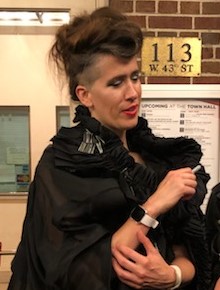
Heap hosted the 62nd Annual Grammy Awards Premiere Ceremony in January 2020. In April 2020, she was a lead artist on the re-release of "I'm God" by producer Clams Casino. This song is considered important in the cloud rap music style. She also released "Phase and Flow" in collaboration with IBM. During the COVID-19 pandemic, she launched an app for fans to see unreleased material and join listening parties.
"Headlock" Resurgence (2021–Present)
In late 2024, video edits of the horror video game Mouthwashing using Heap's song "Headlock" became very popular on TikTok. This led to "Headlock" appearing on the Billboard Hot 100 chart in January 2025, her first time on that chart. It also reached number 30 on the UK Singles Chart in February 2025, becoming her first top-40 hit there.
In March 2025, Heap and Sigsworth reunited as Frou Frou to perform "Let Go" at a concert celebrating the 20th anniversary of the Garden State soundtrack. Her side project, Him Gone Ape, which is an anagram of her name, started in April 2025. In June 2025, she was featured on the song "Distant Strangers" by the Australian group Onefour, which sampled "Headlock."
Technology and Innovation
Mycelia and Digital Rights
In October 2015, Heap created Mycelia, a blockchain-based platform. It's designed as a music database for artists to share their music and use smart contracts. Mycelia's Creative Passport is a special profile for artists who are not signed to major labels.
In April 2021, she released the Firsts Collection, a series of non-fungible tokens (NFTs) with snippets from her online jam sessions. In December 2024, Heap launched Auracles, a digital rights management platform.
Mi.Mu Gloves
In July 2011, Heap showed off a pair of special wired musical gloves at the TEDGlobal conference. She developed them with Tom Mitchell and Rachel Freire. The gloves were inspired by similar musical gloves she saw at MIT. Heap explained that the gloves help her make the sounds from her computer physical, so audiences can understand what she's doing.
The gloves are called Mi.Mu gloves. They are made from a material called Yulex and have sensors that track hand movements. They send data to a computer, which can adjust volume, record loops, and filter sound. The gloves also come with special software called Glover, which works with music production apps.
Heap recorded her song "Me the Machine" using an early version of the gloves in 2012. She also showed the gloves on a BBC TV series. In April 2014, Heap tried to raise money to produce more pairs of the gloves through Kickstarter. Although the campaign didn't reach its goal, the Mi.Mu project found investors. American singer Ariana Grande was an early user of the gloves, using them on her 2015 tour. In April 2019, the Mi.Mu gloves became available for pre-order. In 2021, they sold for £2,500 a pair. Popular Science included the Mi.Mu gloves on their list of the 100 greatest innovations of 2019.
Artificial Intelligence in Music
During the COVID-19 pandemic, Heap started a project called "Augmented Imogen," aiming to create an artificial intelligence (AI) version of herself. In late 2024, she began developing Mogen, also known as AI.Mogen, an AI assistant. It's trained on "anything [she has] ever said or done" and is designed to answer questions about her life and work. It can also collaborate with her on projects and replicate her voice. Heap used AI.Mogen on her 2024 remix of Karin Ann's song "False Gold" and in her 2024 song "What Have You Done to Me?".
Heap has spoken positively about using generative artificial intelligence in art and music. She believes it can be a good tool but has also raised concerns about how AI is trained and the potential for copyright infringement. She has criticized AI music programs that she finds "boring" and advocates for using ethical AI. In 2024, she was noted for her "open-armed embrace of AI," which is different from many other artists.
Heap was a judge for the AI Song Contest 2021. She was also one of many artists who supported Is This What We Want?, a silent protest album released in February 2025. This album was a response to proposed changes in UK copyright laws that could allow AI firms to use copyrighted music for training. In November 2024, she announced a partnership with the generative AI music company Jen for their StyleFilter program. This program lets users create songs with a similar "vibe" to licensed songs.
Musical Style
In the late 1990s, Heap's music was mostly alternative rock. After forming the electronic duo Frou Frou, her music became more focused on pop, especially electropop, art pop, and synth-pop. She has written, produced, and engineered most of her music herself. She has also said that she rarely listens to music, finding inspiration from TED conferences instead.
Heap plays many instruments, including piano, clarinet, cello, guitar, keytar, drums, and array mbira. She uses a lot of changed electronic sounds in her music. She also mixes everyday sounds into her songs, saying that "certain sounds give the music a width and a space." CNN has described her music as a unique mix of soft acoustic sounds, electronica, and technology.
Heap has mentioned that she finds writing lyrics challenging. She sees her lyrics as "secret messages to my friends or my boyfriend or my mum or my dad." She often writes them "in the heat of the moment" about things that have just happened.
Personal Life
Imogen Heap began dating film director Michael Lebor in 2012. She announced in June 2014 that she was expecting her first child with Lebor. Their daughter was born later that year.
During the COVID-19 pandemic, Heap was diagnosed with attention deficit hyperactivity disorder (ADHD).
Discography
Studio albums
- I Megaphone (1998)
- Speak for Yourself (2005)
- Ellipse (2009)
- Sparks (2014)
Awards and Nominations
| Organization | Year | Category | Nominated work | Result | Ref. |
|---|---|---|---|---|---|
| AIM Independent Music Awards | 2015 | Special Catalogue Release of the Year | Sparks (Deluxe Boxset) | Nominated | |
| Drama Desk Award | 2018 | Outstanding Music in a Play | Harry Potter and the Cursed Child | Won | |
| Grammy Awards | 2007 | Best New Artist | Herself | Nominated | |
| Best Song Written for Visual Media | "Can't Take It In" | Nominated | |||
| 2010 | Best Pop Instrumental Performance | "The Fire" | Nominated | ||
| Best Engineered Album, Non-Classical | Ellipse | Won | |||
| 2016 | Album of the Year | 1989 (as producer and engineer) | Won | ||
| 2020 | Best Musical Theatre Album | The Music of Harry Potter and the Cursed Child In Four Contemporary Suites | Nominated | ||
| Ivor Novello Awards | 2010 | International Achievement | Herself | Won | |
| Laurence Olivier Awards | 2017 | Outstanding Achievement in Music | Harry Potter and the Cursed Child | Nominated | |
| MTVU Woodie Awards | 2006 | Best Emerging Artist | Herself | Nominated | |
| Most Original Artist | Nominated | ||||
| Most Downloaded | "Hide and Seek" | Nominated | |||
| Music Producers Guild Awards | 2018 | Inspiration Award | Herself | Won | |
| Music Week Awards | 2015 | Inspirational Artist | Herself | Won | |
| World Soundtrack Awards | 2006 | Best Original Song Written Directly for a Film | "Can't Take It In" | Nominated |
See also
 In Spanish: Imogen Heap para niños
In Spanish: Imogen Heap para niños
 | Emma Amos |
 | Edward Mitchell Bannister |
 | Larry D. Alexander |
 | Ernie Barnes |


